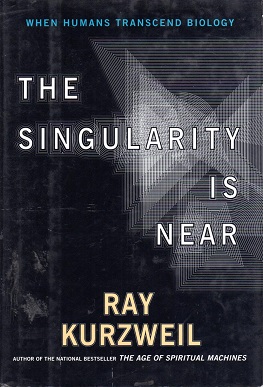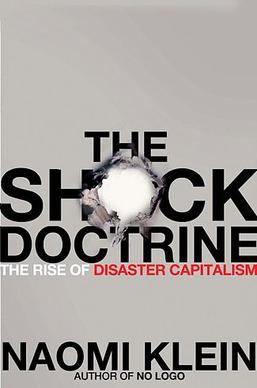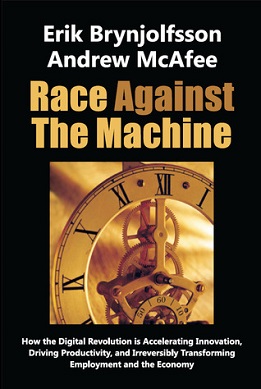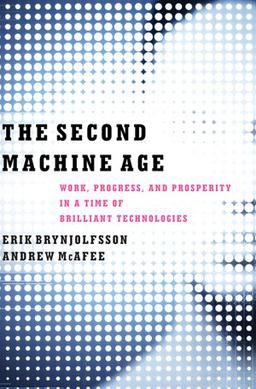
Raymond Kurzweil is an American computer scientist, author, inventor, and futurist. He is involved in fields such as optical character recognition (OCR), text-to-speech synthesis, speech recognition technology, and electronic keyboard instruments. He has written books on health, artificial intelligence (AI), transhumanism, the technological singularity, and futurism. Kurzweil is a public advocate for the futurist and transhumanist movements and gives public talks to share his optimistic outlook on life extension technologies and the future of nanotechnology, robotics, and biotechnology.
The technological singularity—or simply the singularity—is a hypothetical future point in time at which technological growth becomes uncontrollable and irreversible, resulting in unforeseeable changes to human civilization. According to the most popular version of the singularity hypothesis, I. J. Good's intelligence explosion model, an upgradable intelligent agent will eventually enter a "runaway reaction" of self-improvement cycles, each new and more intelligent generation appearing more and more rapidly, causing an "explosion" in intelligence and resulting in a powerful superintelligence that qualitatively far surpasses all human intelligence.

The Age of Spiritual Machines: When Computers Exceed Human Intelligence is a non-fiction book by inventor and futurist Ray Kurzweil about artificial intelligence and the future course of humanity. First published in hardcover on January 1, 1999 by Viking, it has received attention from The New York Times, The New York Review of Books and The Atlantic. In the book Kurzweil outlines his vision for how technology will progress during the 21st century.

Bryan Douglas Caplan is an American economist and author. Caplan is a professor of economics at George Mason University, research fellow at the Mercatus Center, adjunct scholar at the Cato Institute, and former contributor to the Freakonomics blog and EconLog. He currently publishes his own blog, Bet on It. Caplan is a self-described "economic libertarian". The bulk of Caplan's academic work is in behavioral economics and public economics, especially public choice theory.

Steve Keen is an Australian economist and author. He considers himself a post-Keynesian, criticising neoclassical economics as inconsistent, unscientific and empirically unsupported.

The Singularity Is Near: When Humans Transcend Biology is a 2005 non-fiction book about artificial intelligence and the future of humanity by inventor and futurist Ray Kurzweil.

The Age of Intelligent Machines is a non-fiction book about artificial intelligence by inventor and futurist Ray Kurzweil. This was his first book and the Association of American Publishers named it the Most Outstanding Computer Science Book of 1990. It was reviewed in The New York Times and The Christian Science Monitor. The format is a combination of monograph and anthology with contributed essays by artificial intelligence experts such as Daniel Dennett, Douglas Hofstadter, and Marvin Minsky.

Matthew Yglesias is an American blogger and journalist who writes about economics and politics. Yglesias has written columns and articles for publications such as The American Prospect, The Atlantic, and Slate. In November 2020, he left his position as an editor and columnist at the news website Vox, which he co-founded in 2014, to publish the Substack newsletter Slow Boring. He is an editor-at-large at Grid, a website of current affairs reporting with a lens on interconnections amongst major challenges. He is currently a Senior Fellow at the Niskanen Center. He also cohosts Grid's podcast "Bad Takes" with Executive Editor Laura McGann, the former Politics and Policy Editor at Vox consisting of conversations between McGann and Yglesias on a “bad take” they’ve seen on the internet.

Erik Brynjolfsson is an American academic, author and inventor. He is the Jerry Yang and Akiko Yamazaki Professor and a Senior Fellow at Stanford University where he directs the Digital Economy Lab at the Stanford Institute for Human-Centered AI, with appointments at SIEPR, the Stanford Department of Economics and the Stanford Graduate School of Business. He is also a research associate at the National Bureau of Economic Research and a best-selling author of several books. He is known for his contributions to the world of IT productivity research and work on the economics of information and the digital economy more generally.

Tyler Cowen is an American economist, columnist and blogger. He is a professor at George Mason University, where he holds the Holbert L. Harris chair in the economics department. He hosts the economics blog Marginal Revolution, together with co-author Alex Tabarrok. Cowen and Tabarrok also maintain the website Marginal Revolution University, a venture in online education.
Economic stagnation is a prolonged period of slow economic growth, usually accompanied by high unemployment. Under some definitions, "slow" means significantly slower than potential growth as estimated by macroeconomists, even though the growth rate may be nominally higher than in other countries not experiencing economic stagnation.

The Shock Doctrine: The Rise of Disaster Capitalism is a 2007 book by the Canadian author and social activist Naomi Klein. In the book, Klein argues that neoliberal free market policies have risen to prominence in some developed countries because of a deliberate strategy of "shock therapy". This centers on the exploitation of national crises to establish controversial and questionable policies, while citizens are too distracted to engage and develop an adequate response, and resist effectively. The book advances the idea that some man-made events, such as the Iraq War, were undertaken with the intention of pushing through such unpopular policies in their wake.

Technological unemployment is the loss of jobs caused by technological change. It is a key type of structural unemployment.

The Declaration of Independents: How Libertarian Politics Can Fix What's Wrong with America is a 2011 non-fiction book by American political writers Matt Welch and Nick Gillespie. Welch is the former editor-in-chief of Reason, a position Gillespie also held from 2000 to 2008. The authors discuss the nature and influence of libertarianism in the United States. It is published by PublicAffairs, an imprint of the Perseus Books Group.

The Great Stagnation: How America Ate All the Low-Hanging Fruit of Modern History, Got Sick, and Will (Eventually) Feel Better is a pamphlet by Tyler Cowen published in 2011. It argues that the American economy has reached a historical technological plateau and the factors that drove economic growth for most of America's history are no longer present. These figurative "low-hanging fruit" include the cultivation of much free, previously unused land, technological breakthroughs in transport, refrigeration, electricity, mass communications, sanitation, and the growth of education. Cowen, a professor of economics at George Mason University, theorizes that these factors have contributed to stagnation in the median American wage since 1973.

Race Against the Machine is a non-fiction book from 2011 by Erik Brynjolfsson and Andrew McAfee about the interaction of digital technology, employment and organization. The full title of the book is: Race Against the Machine: How the Digital Revolution Is Accelerating Innovation, Driving Productivity, and Irreversibly Transforming Employment and the Economy.

Andrew Paul McAfee, a principal research scientist at MIT, is cofounder and codirector of the MIT Initiative on the Digital Economy at the MIT Sloan School of Management. He studies how digital technologies are changing the world.
In economics, secular stagnation is a condition when there is negligible or no economic growth in a market-based economy. In this context, the term secular means long-term, and is used in contrast to cyclical or short-term. It suggests a change of fundamental dynamics which would play out only in its own time. The concept was originally put forth by Alvin Hansen in 1938. According to The Economist, it was used to "describe what he feared was the fate of the American economy following the Great Depression of the early 1930s: a check to economic progress as investment opportunities were stunted by the closing of the frontier and the collapse of immigration". Warnings of impending secular stagnation have been issued after all deep recessions since the Great Depression, but the hypothesis has remained controversial.

The Second Machine Age: Work, Progress, and Prosperity in a Time of Brilliant Technologies is a 2014 book by Erik Brynjolfsson and Andrew McAfee which is a continuation of their book Race Against the Machine. They argue that the Second Machine Age involves the automation of a lot of cognitive tasks that make humans and software-driven machines substitutes, rather than complements. They contrast this with what they call the "First Machine Age", or Industrial Revolution, which helped make labor and machines complementary.
Engels' pause is a term coined by economic historian Robert C. Allen to describe the period from 1790 to 1840, when British working-class wages stagnated and per-capita gross domestic product expanded rapidly during a technological upheaval. Allen named the period after German philosopher Friedrich Engels, who describes it in The Condition of the Working Class in England. Economists have analyzed its causes and effects since the nineteenth century, with some questioning its existence. Twenty-first-century technological upheaval and wage stagnation have led economists and academics to draw parallels between the two periods.
















